From the bustling streets of Karachi to the boardrooms across the U.S., Abu Bakar’s journey is a testament to the power of global experience and the pull of home. After a 33-year career in the United States, culminating in senior leadership roles, he has returned to Pakistan, not as a spectator, but as a catalyst. As the CEO of the Pakistan Software Export Board (PSEB), Abu Bakar is tasked with a singular, ambitious goal: to propel Pakistan’s IT industry onto the global stage.
With over 60% of Pakistan’s population under 30, the country is home to a youthful, tech-savvy generation primed for growth. Abu Bakar recognizes this untapped potential, believing that while raw talent exists in abundance, the key is honing this talent and bridging the gap between potential and achievement. He is armed with over two decades of multi-industry experience and a clear vision, and is determined to bridge the gap, transforming Pakistan’s raw talent into a powerhouse of software exports. ‘There is only one agenda and one goal,’ he states firmly, ‘to increase the software exports of the country.’ This is not just a job for Abu Bakar; it is a mission. In this exclusive interview, we delve into his unique perspective, his strategic priorities, and his vision for a future where Pakistan’s IT sector not only thrives but leads.
Abu Bakar’s Blueprint to Position Pakistan as a Global Tech Hub
Abu Bakar’s journey back to Pakistan was not a spontaneous decision. It was the culmination of a career spent witnessing the transformative power of technology, and a deep-seated desire to contribute to his homeland. ‘I saw the immense potential that the country and the youth of the country has,’ he explains, ‘and I thought I would just give it a shot, having that exposure to bring it back. And this ‘exposure’ is significant. Over 33 years in the United States, he honed his expertise in diverse industries, consistently driving growth and innovation. Now, as CEO of PSEB, he is channeling that experience into a singular focus: boosting Pakistan’s software exports.
“Our primary goal is clear and focused: to increase Pakistan’s software exports.”
This ambition is not just about increasing revenue, but about positioning Pakistan as a global hub for cutting-edge software development and IT services. This means identifying sectors where Pakistan’s talent can lead—be it AI, cloud computing, cybersecurity, or software development—and ensuring we build the right ecosystem to foster these areas. But how does one achieve this ambitious goal in a rapidly evolving digital landscape? Abu Bakar’s assessment is both realistic and optimistic. He acknowledges the inherent challenges, but emphasizes the vast opportunities that lie within Pakistan’s youthful population. ‘Somewhere over 60% of our population is youth, predominantly English-speaking, very connected, technically savvy, have the potential to learn, but some raw talent.’
He also recognizes the pockets of excellence that exist across the country, but is quick to point out a crucial gap: the lack of effective storytelling. ‘We just do not do a good job of telling our story and highlighting that. I think once you start to do that, people start to believe that there is, there is a real economy here.’ This emphasis on storytelling is not just about public relations; it is about building confidence and attracting investment. It is about showcasing the tangible results of Pakistan’s burgeoning tech sector to the world.
‘I think there are a lot of success stories. Across the country, I’ve met many enterprising young entrepreneurs who are making waves on the global stage,” he reflects. “Their stories, however, often go untold. Highlighting these successes will not only build confidence in our domestic economy but will attract the international attention and investment we need.”
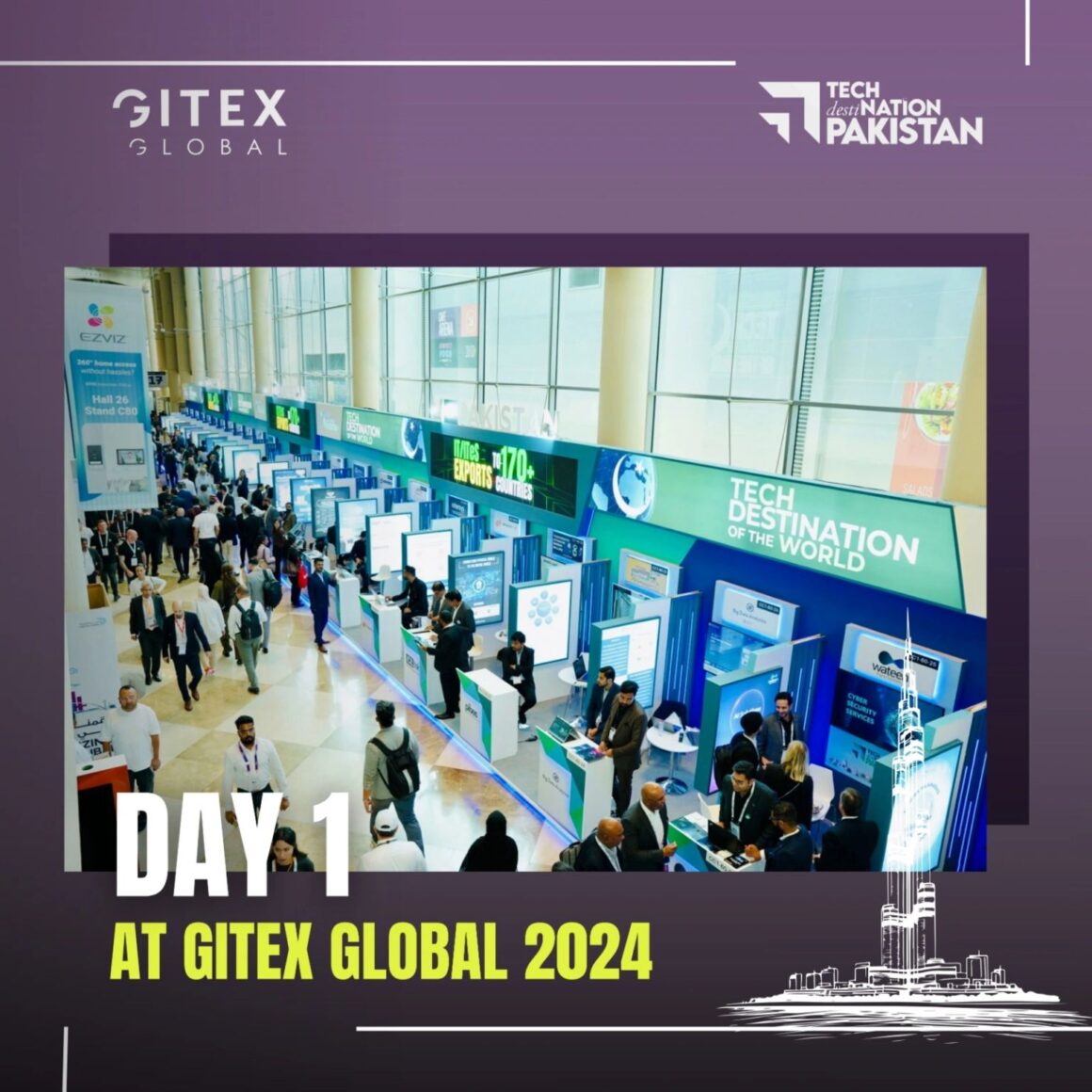
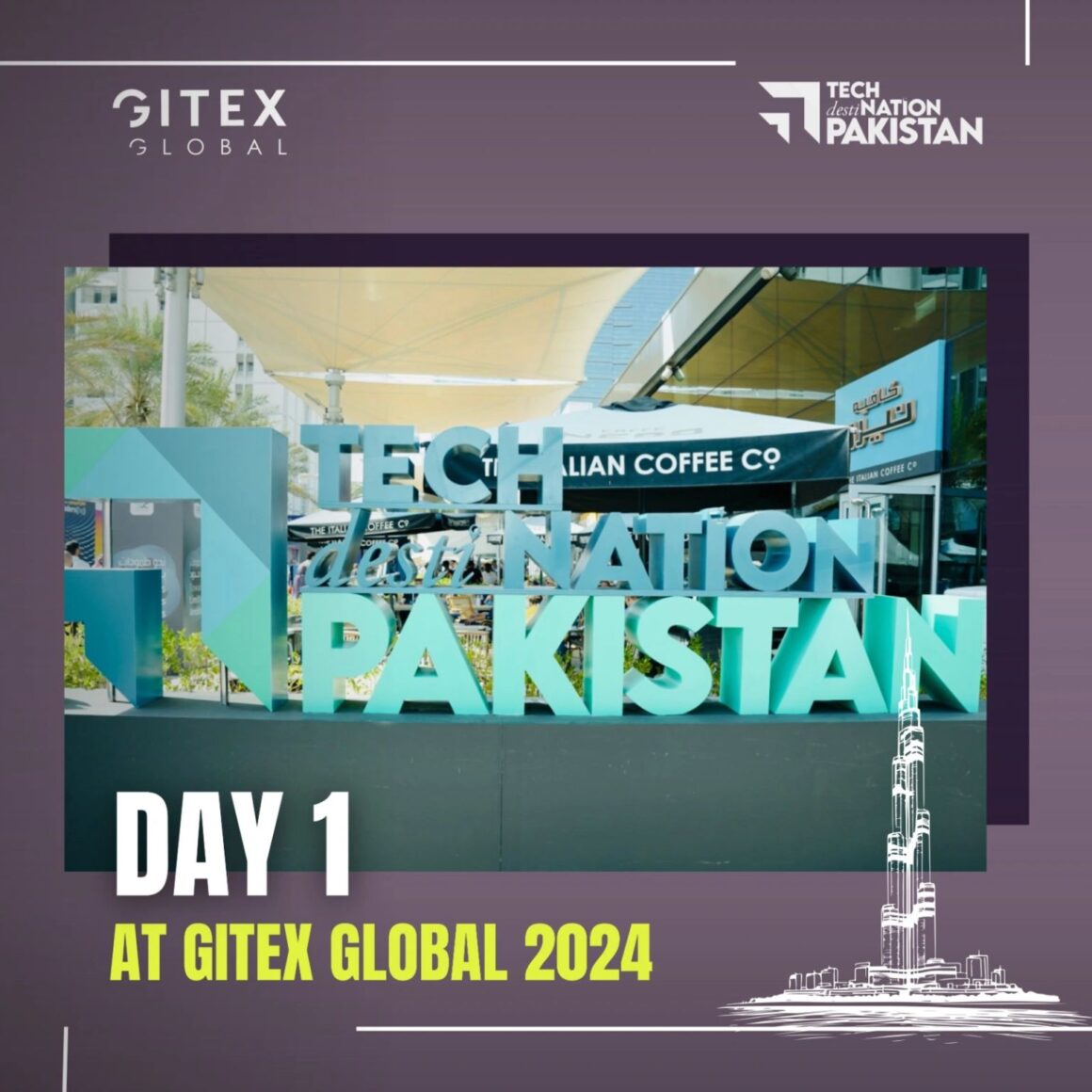
The Path to $15 Billion in Exports
With a clear mandate to elevate Pakistan’s IT exports, PSEB is navigating the complex landscape of global competition. The ambitious target, set by the Prime Minister, is to reach $15 billion in IT software exports, part of a larger $25 billion goal encompassing broader IT services.
‘It is not going to be one thing that will just pick this from 3.2 to 15 in five years,’ Abu Bakar explained. ‘So you have to build these building blocks for it.’ PSEB recognizes that achieving this target requires a multi-faceted approach. Central to this strategy is the expansion of the IT workforce and the enhancement of its productivity. PSEB aims to increase the number of professionals employed in software houses from 170,000 to 350,000, while also driving an increase in average earnings. This growth will be supported by initiatives across key sectors: software services, BPO, freelancing, and product development. To facilitate this growth, PSEB is actively working to improve the ease of doing business in Pakistan’s tech sector. ‘Even right now, we have close to 9000 registered PSEB companies,’ said Abu Bakar, highlighting the program’s existing reach and benefits like reduced export tax rates.
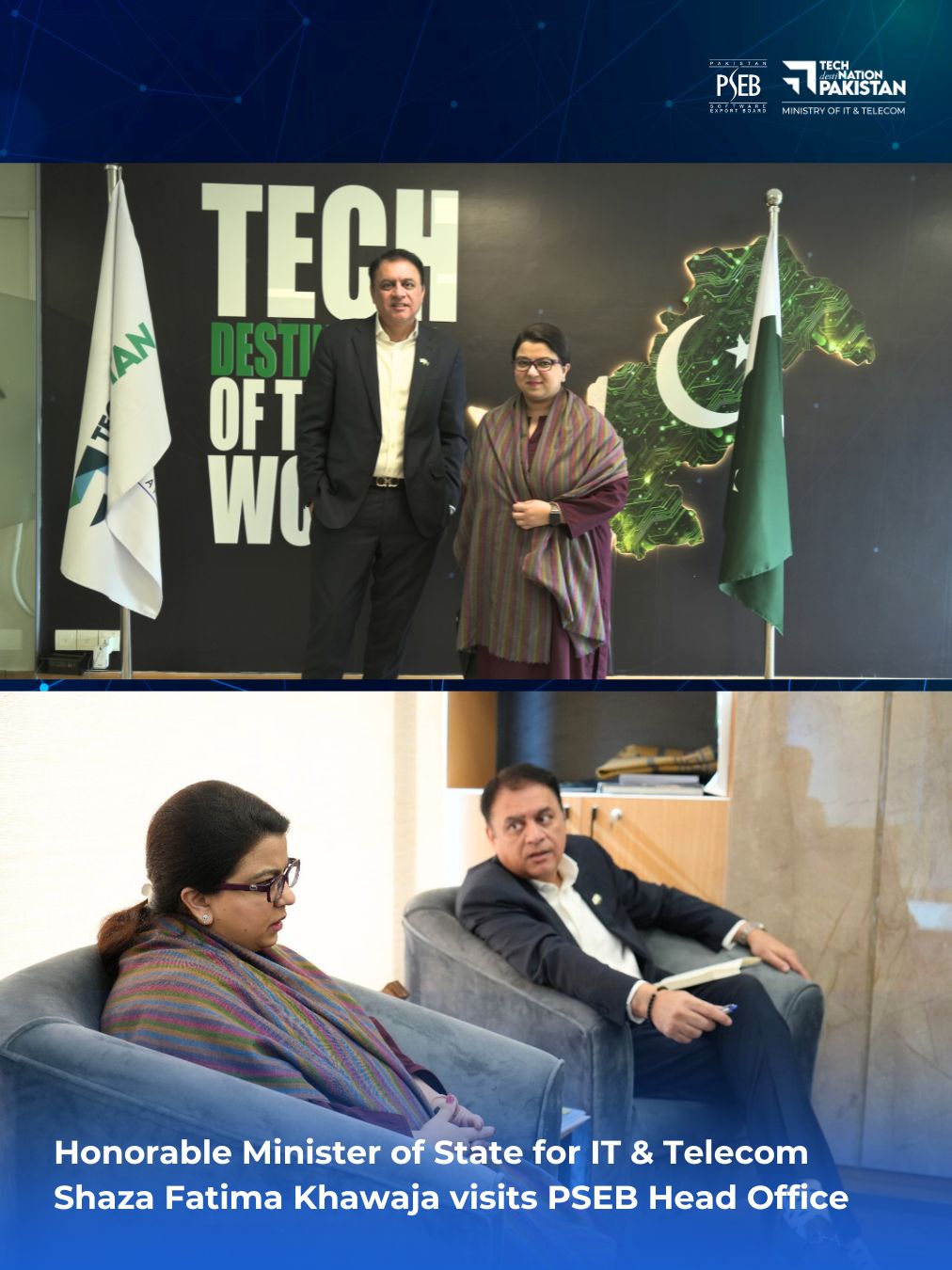
PSEB also engages in policy advocacy, working with industry stakeholders to address regulatory challenges and create a more favorable business environment. Skills development is another critical focus, with PSEB facilitating industry-led training programs. One such program achieved an impressive 80% employability rate, demonstrating the effectiveness of industry-driven training.
Recognizing the vital role of freelancers in Pakistan’s tech ecosystem, PSEB provides support through initiatives like Software Technology Parks and E-Rozgaar centers. These centers offer subsidized spaces, free internet, and uninterrupted power supply, enabling freelancers to connect and collaborate. ‘Freelancer opens up a huge amount of that opportunity,’ Abu Bakar noted, emphasizing the dual benefit of increasing exports and providing employment for youth.
“Freelancing represents a significant opportunity for our youth, especially in specialized fields like software development, UI/UX design, and digital marketing. PSEB’s initiatives, like the E-Rozgaar centers, not only provide the infrastructure—free internet, uninterrupted power, and collaboration spaces—but also ensure that freelancers are equipped with the skills to thrive in high-demand tech areas. By connecting freelancers with global markets, we’re tapping into an underutilized potential to increase exports and create more job opportunities in Pakistan’s growing tech ecosystem.”
Infrastructure for Growth: Expanding Software Technology Parks
Software Technology Parks are a cornerstone of PSEB’s infrastructure strategy. With 43 operational parks and plans for further expansion, these centers provide essential resources and connectivity for IT companies. ‘There is a huge potential,’ Abu Bakar stated, indicating PSEB’s commitment to expanding this infrastructure.
“We are focused on building scalable infrastructure that supports the tech sector’s growth. This includes expanding our Software Technology Parks, which are vital to creating an ecosystem where tech companies can thrive. For instance, we’ve seen a 96% occupancy rate in our existing parks, and this is generating over $21 million in exports. We’re looking to grow this infrastructure further and introduce specialized parks for emerging tech sectors like AI, blockchain, and IoT, ensuring that companies in these fields have the resources and network they need to succeed.”
PSEB’s strategy, as outlined by Abu Bakar, is built on a foundation of clear goals, strategic initiatives, and a commitment to fostering a thriving tech ecosystem in Pakistan. While PSEB works to bolster the tech sector, access to capital remains a crucial challenge. He adds,
“A major challenge we face is facilitating access to capital for tech startups and established companies. Despite the sector’s significant contribution to the economy, the capital markets have not yet fully embraced tech. We are actively engaging with stock exchanges and financial institutions to unlock new funding avenues, and we are also looking into creating specialized funds for emerging tech sectors. This is critical to fostering the next generation of Pakistani unicorns and scaling existing companies.”
Human resource supply and skill development are also key priorities. Abu Bakar emphasized a shift in focus from mere training numbers to actual employment outcomes. ‘Our KPI should not be training. Our KPI should be employment. How many jobs are we creating?’ he asserted. PSEB is working to ensure that training programs lead to tangible employment opportunities. ‘I am not interested in 4000, I am interested in 3200 because 3200 were the ones that actually generated the employment,’ he explained, highlighting the success of industry-driven training initiatives.
“Training programs are vital, but our true metric for success is employment. We’re shifting from just building skill sets to directly connecting talent with employment opportunities in high-demand areas like data science, software engineering, and cybersecurity. Our industry-driven training programs have an 80% employability rate, and we plan to scale this with targeted curriculums that align with the skills required by emerging tech industries.”
Owning the Narrative: Telling Pakistan’s Technology Story
Enhancing Pakistan’s brand and image globally is another critical objective. ‘That is probably going to be one of the most important as well as the most challenging part,’ Abu Bakar noted. PSEB is actively participating in international events to showcase Pakistan’s tech capabilities. The recent global events, whether it was GITEX in Dubai, LEAP in KSA or Web Summit in Qatar, has been a tremendous success, with a strong Pakistani presence. ‘I felt so good and so proud to walk into GITEX as the pavilion was all over. It was right in the center stage,’ Abu Bakar recalled. ‘Pakistan was all over.’ While specific deals from these international events remain confidential, PSEB is actively fostering government-level collaborations. ‘There is a lot of activity going on at the government level,’ Abu Bakar stated, highlighting MOUs and ongoing discussions with countries like Saudi Arabia, Qatar, UAE, China, Korea, and Japan.
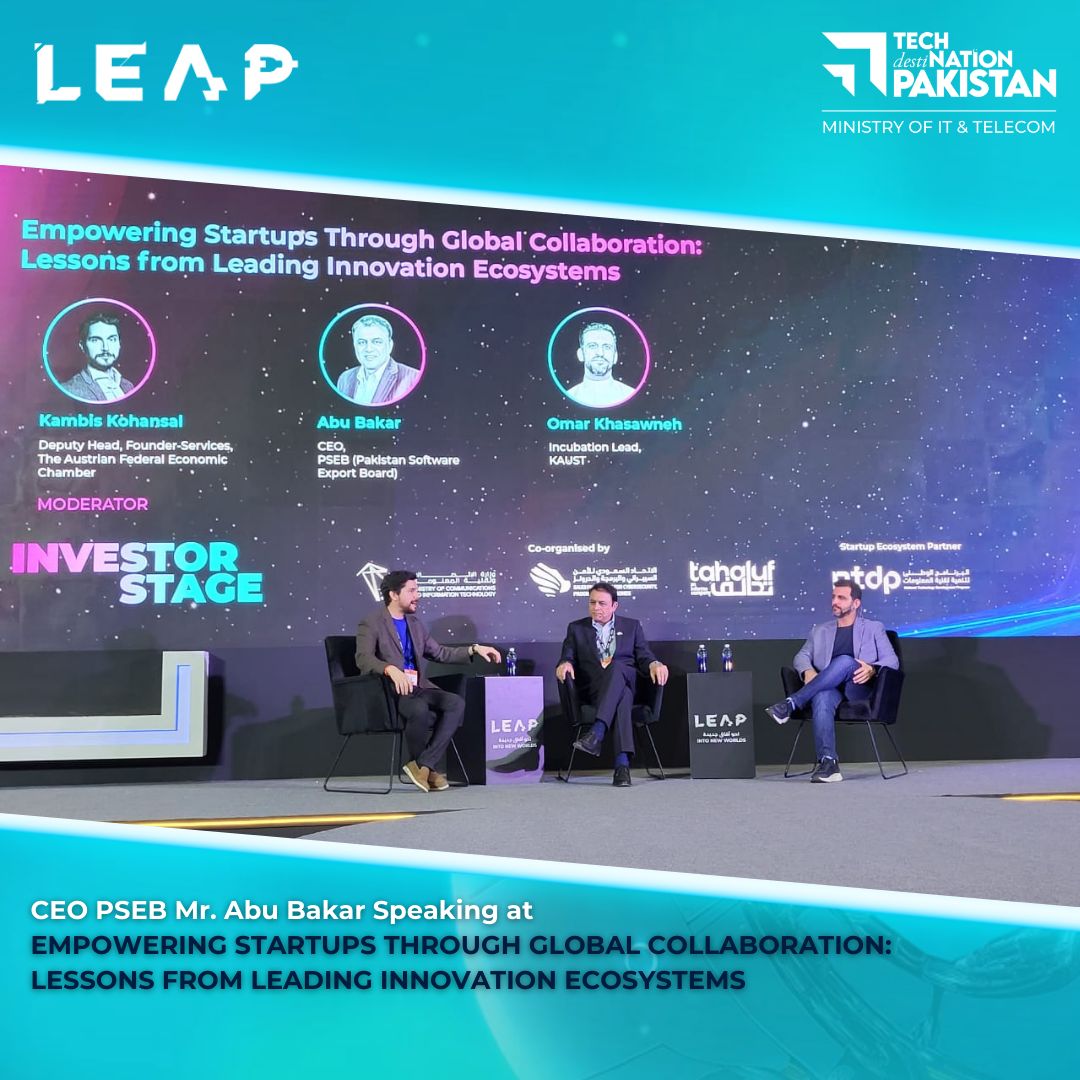
“At these global events, we showcased Pakistan’s growing capabilities in sectors like AI, software development, and fintech. Our presence at such key events isn’t just about visibility; it’s about creating a platform where we can demonstrate our sector’s capabilities. When we engage with international clients and partners, we ensure that Pakistan’s innovations in machine learning, cloud computing, and cybersecurity are front and center. The next step is to bring even more specialized showcases, focusing on the technical prowess of Pakistan’s top developers and engineers.” PSEB is focused on maximizing the return on investment from these events. ‘Every time when we spend $1 in any of these events, we usually get 40 plus back in committed revenues from projects that are signed by the companies that we subsidize to be present there,’ he revealed, showcasing the tangible benefits of their marketing efforts.
Harnessing Soft Power: Pakistan’s Cultural Appeal in Tech Business
Pakistan’s participation in GITEX, LEAP and then Qatar WebSummit has significantly boosted the country’s tech industry reputation. ‘It is confidence building,’ Abu Bakar emphasized. ‘I always say for the last 25 years that I have been in this industry, and people across the world will not believe it until they come and see it.’ He stressed the importance of showcasing Pakistan’s hospitality and culture to change perceptions. He shared a personal anecdote demonstrating Pakistan’s soft image through cultural immersion, through experiencing Pakistan firsthand, emphasizing that ‘people across the world won’t believe it until they come and see it’.
“In 2006, after years of reluctance, I finally convinced my colleagues at the time from the USA to visit Lahore for a week. Their initial hesitations completely dissolved during that visit, resulting in a profound change of perspective. Fifteen years later, two of them are now employed by a Pakistani company, spending three months annually working in Lahore.”
He emphasized how Pakistan’s rich cultural heritage, renowned hospitality, and the humble nature of its people serve as a powerful form of soft power. ‘The beauty of that instance,’ he recalled, ‘was that after traveling the world for three months, they found the culture and the people here uniquely welcoming.’ He suggested that this inherent warmth and openness are crucial for building trust and fostering long-term relationships, which lay the foundation for strong business partnerships. ‘Once you experience the people, the hospitality, the culture, the food from Pakistan,’ he stated, ‘it changes your perception’. This showcasing of soft power through cultural exchange and personal interaction is a vital component of PSEB’s strategy to attract investment and build a positive global image for Pakistan’s tech industry.
Resilience in the Face of Challenges: The Strength of Pakistan’s Tech Sector
He spoke of the industry’s resilience with palpable admiration. ‘In my first few months, I’ve seen firsthand the unwavering resilience of this sector. No matter the obstacle, they find a way forward’.
‘We grew 25% last year. Also right? We went from 2.6 to 3.2 and then we are going to hopefully grow more this year. And we have momentum this year also, so we are going to continue despite everything that we can talk about. This industry is so resilient. The people are so resilient that they figure out and move, keep moving forward. And I think that is, that is credit to know.’
“Pakistan’s tech sector is poised to capitalize on key trends such as artificial intelligence, blockchain technology, and cloud services. These areas are not just future-facing—they’re already shaping industries globally. PSEB is working closely with educational institutions and industry partners to ensure that our talent pool is prepared to lead in these fields. We are also exploring partnerships with global tech firms to bring best practices and knowledge transfer to our local market, positioning Pakistan as a leader in next-gen technologies.”
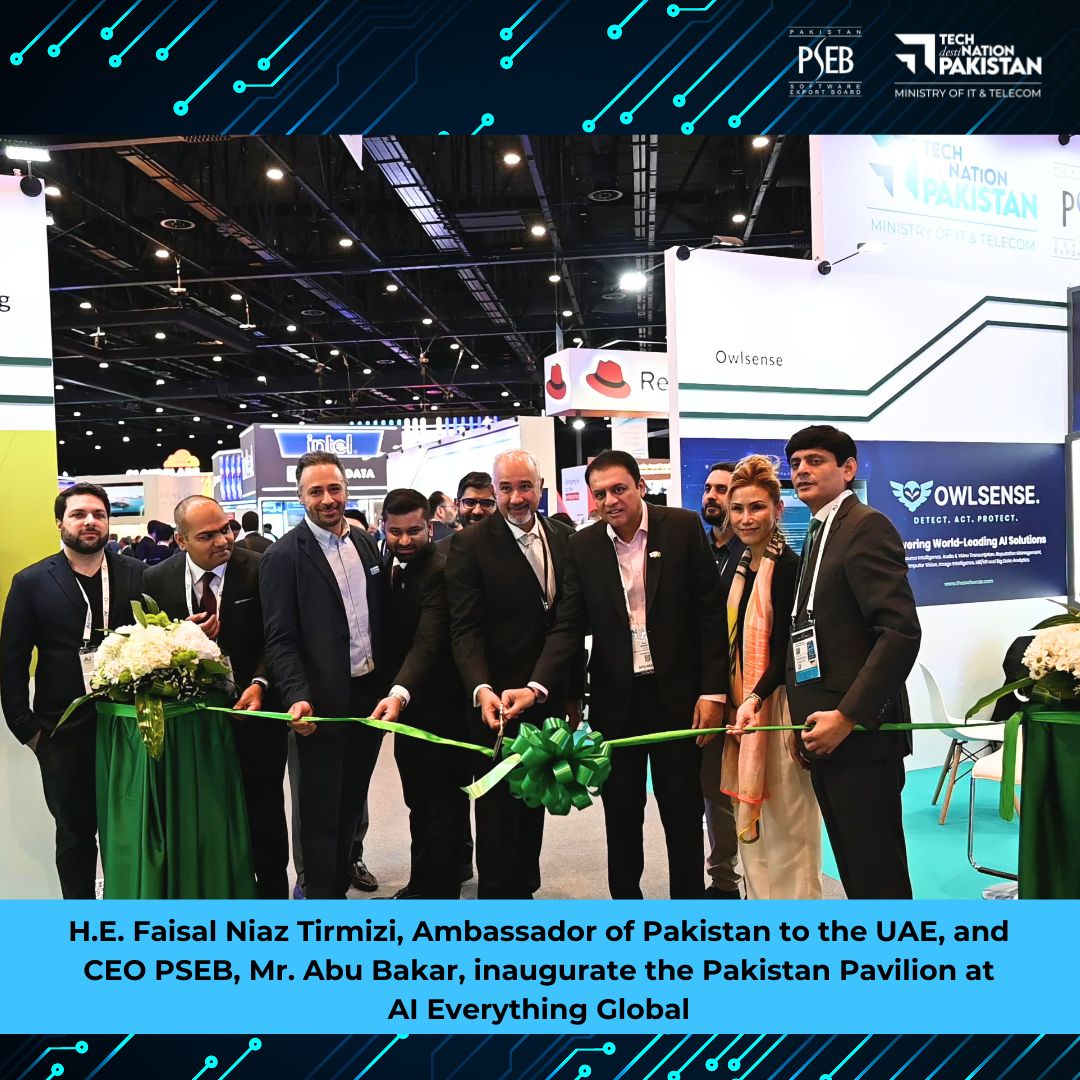
Pakistan Software Export Board, under Abu Bakar’s leadership, is strategically positioned to transform Pakistan’s tech narrative. By focusing on export growth, fostering a conducive business environment, and leveraging the nation’s immense talent pool, PSEB is not just building an industry; it is shaping a future where Pakistan stands as a formidable player in the global tech arena. The journey is ambitious, but with a clear vision and unwavering commitment, PSEB is poised to turn potential into reality, making Pakistan a true ‘Tech Destination of the Year’ and beyond.
As CWPakistan turns thirty we want to celebrate Pakistan’s technology industry and its forthcoming rise and tell those stories which we think are really important for 2025 and starting with the first two that CWPK Academy/SPIN Studio release this year, is an interview with CEO PSEB Abu Bakar who talks about how making Pakistan a tech destination, in real terms, works.
Interview conducted/edited by Aqsa Tariq, Editor in Chief, CWPakistan (Smart Pakistan Insights Network).






